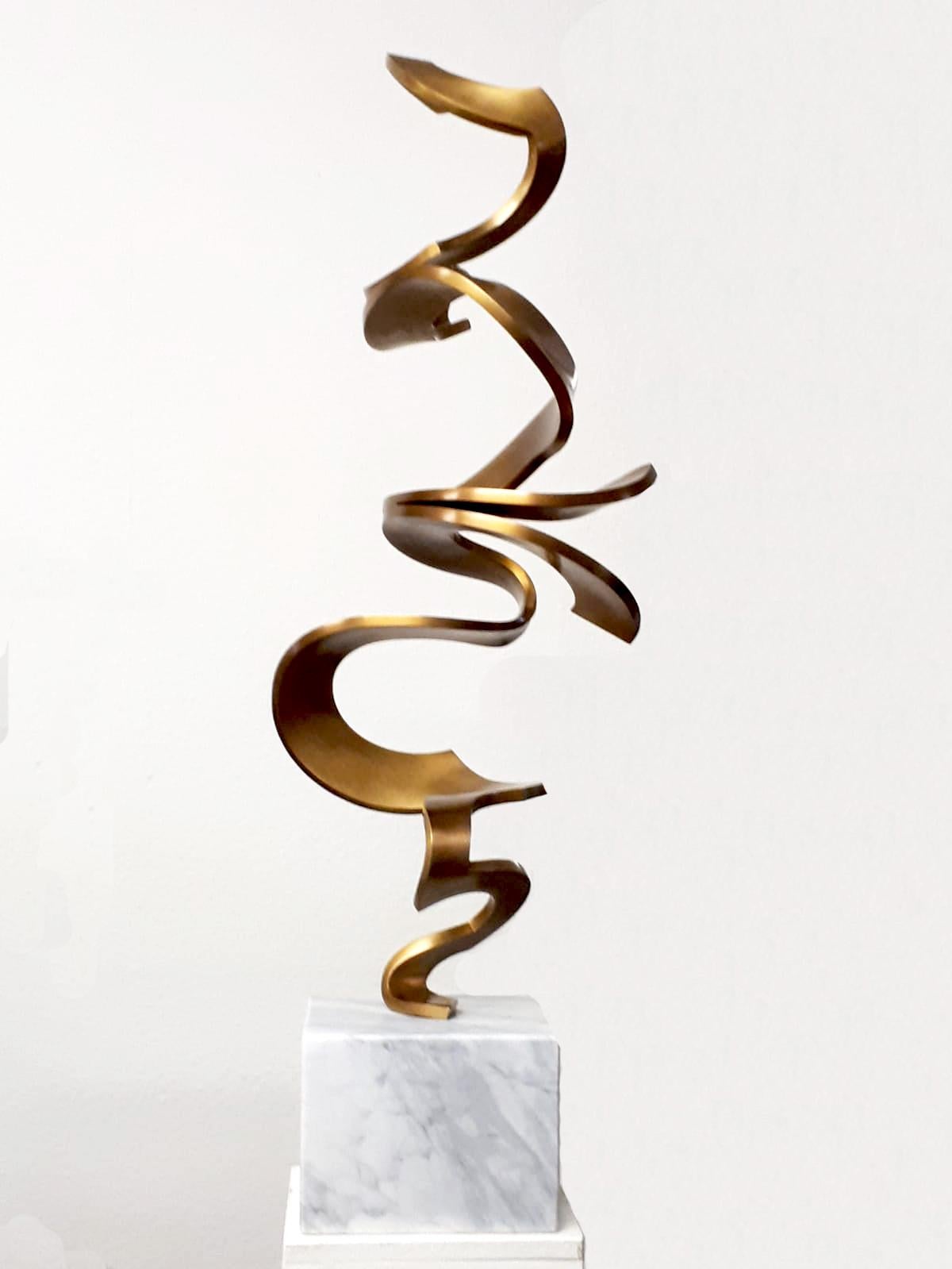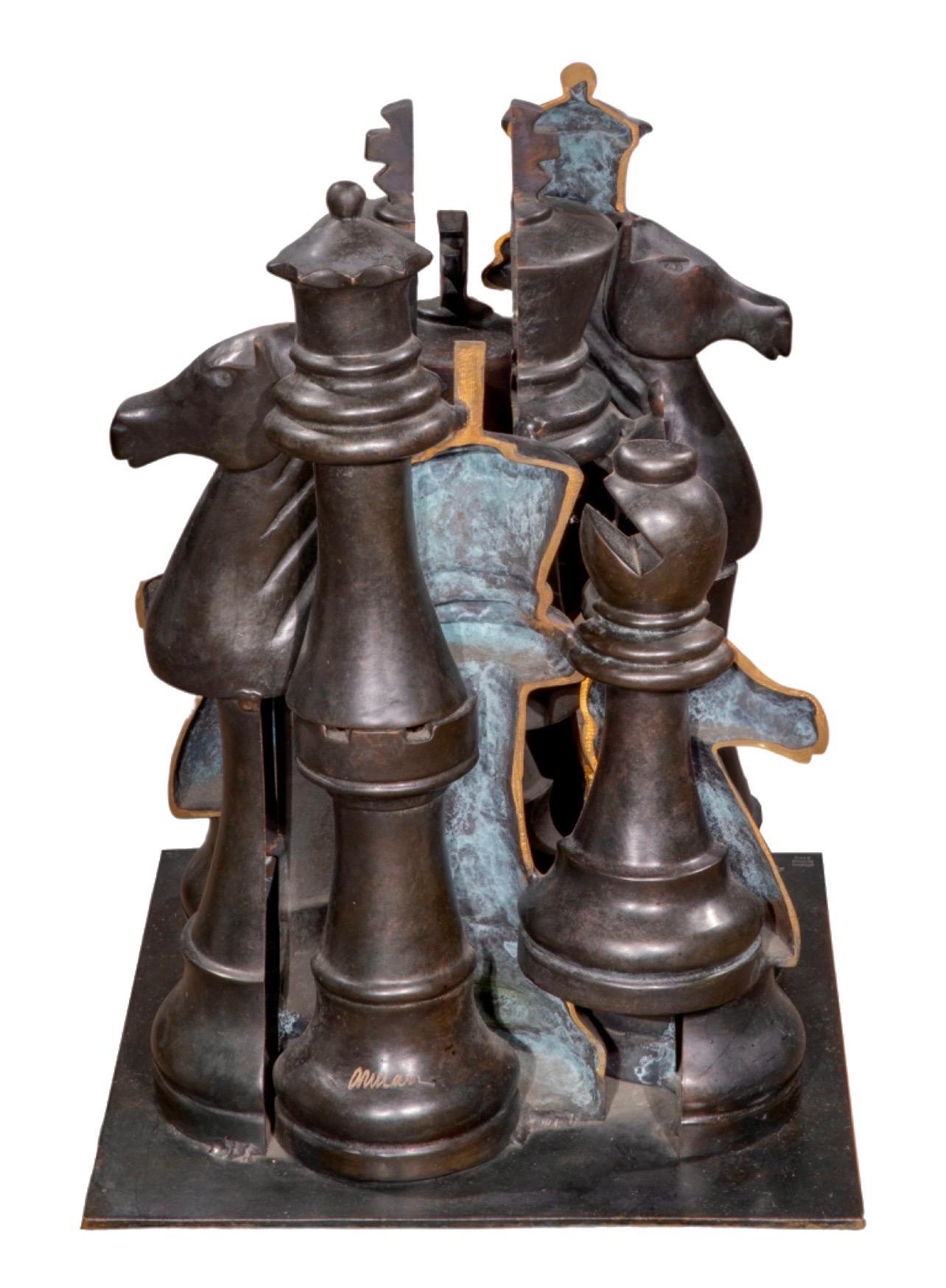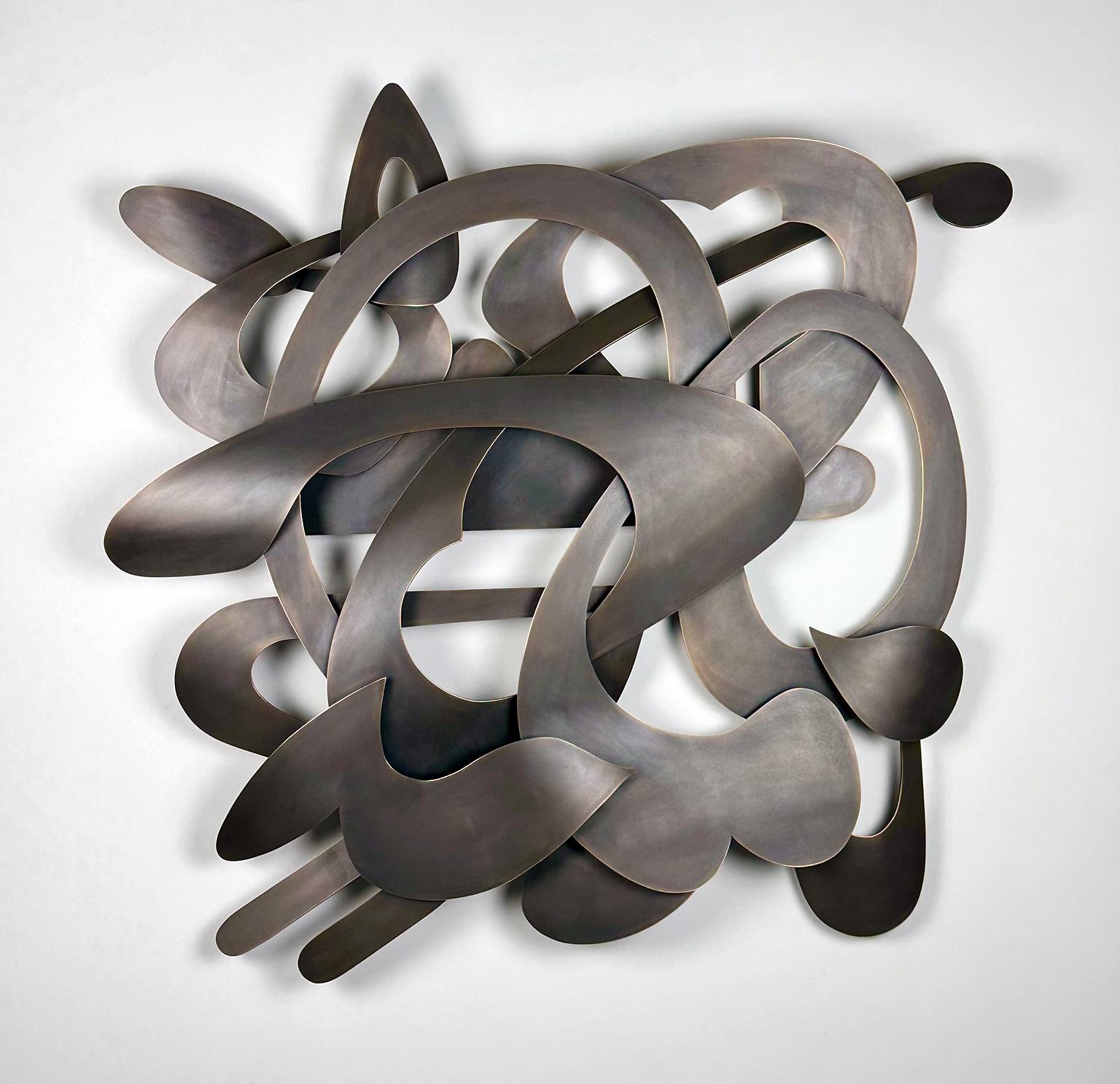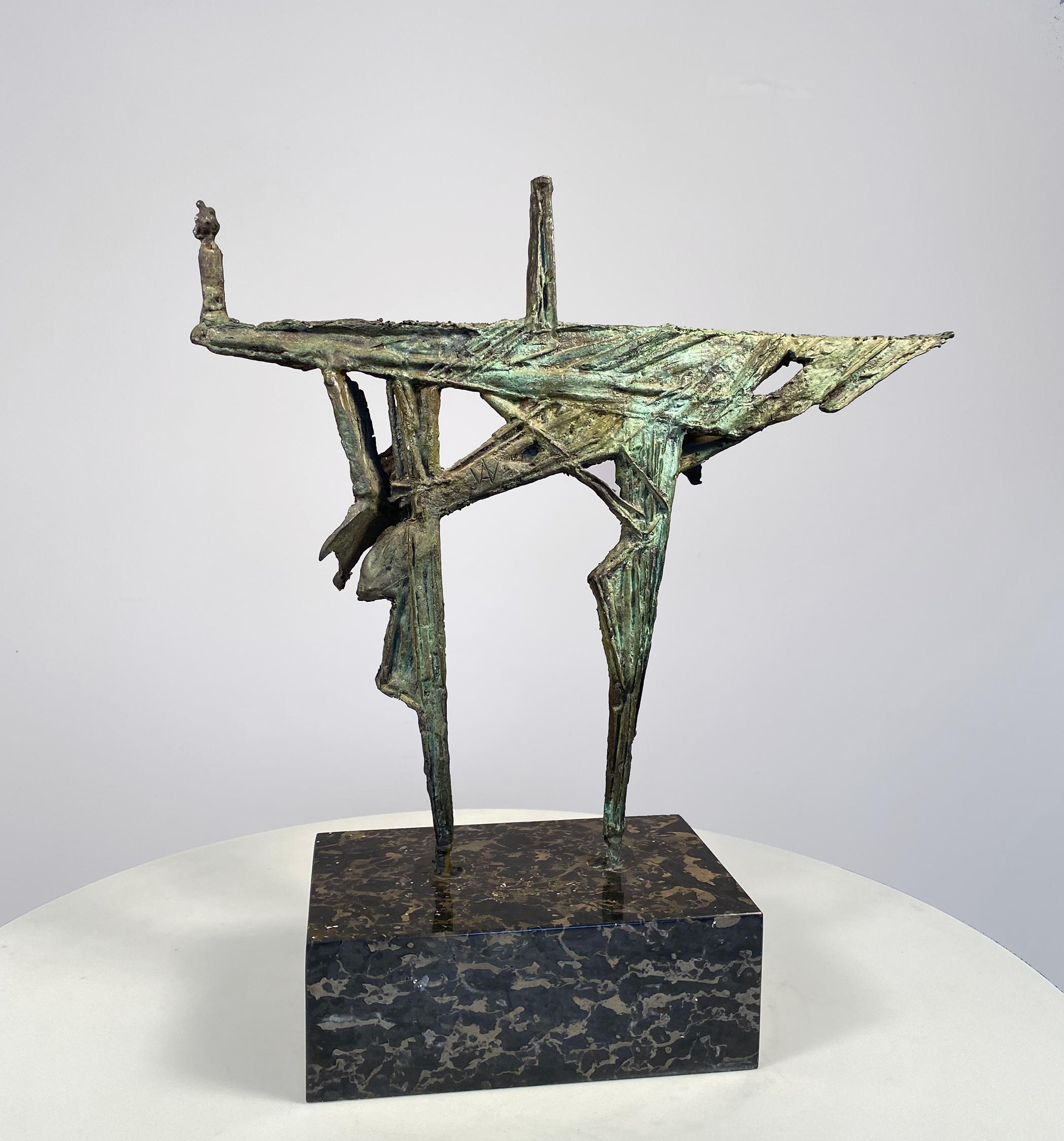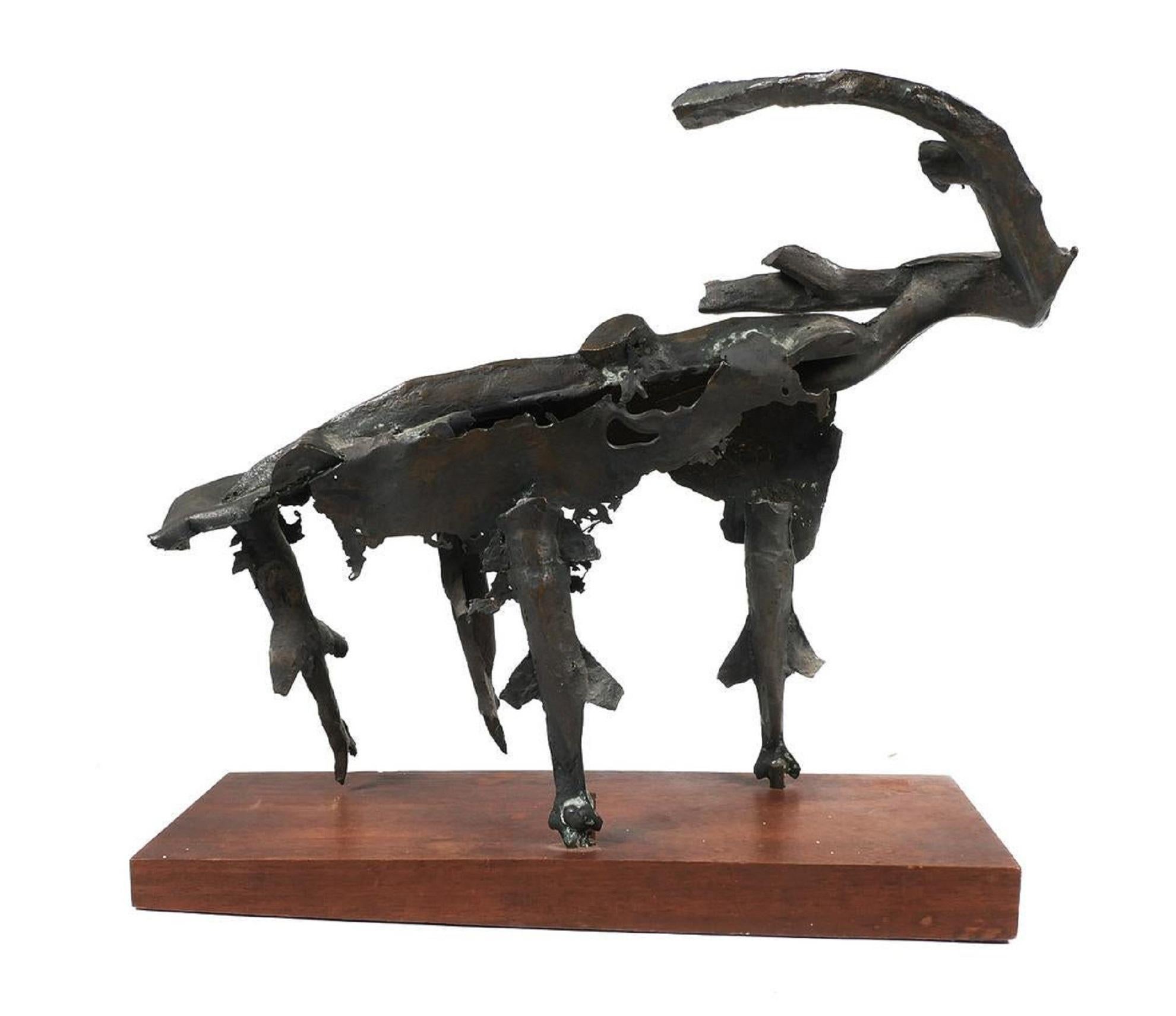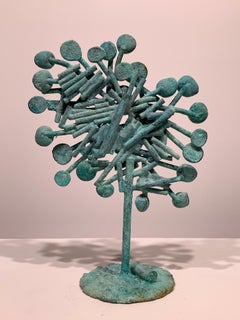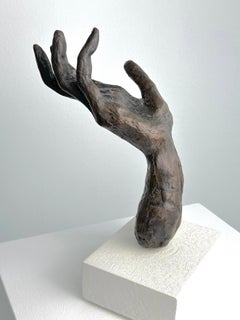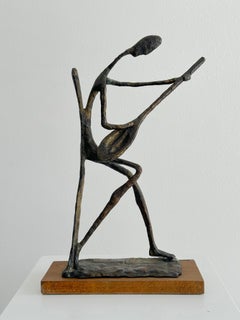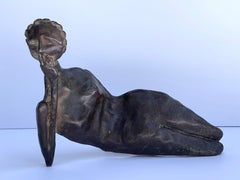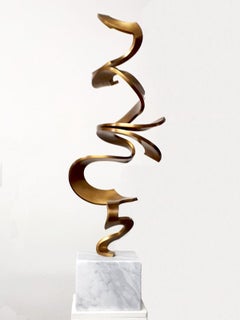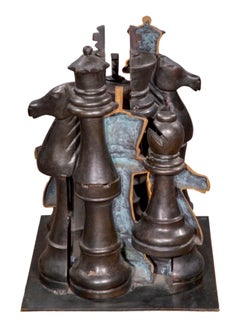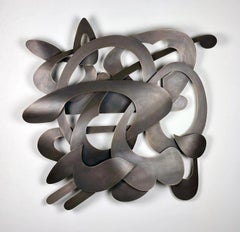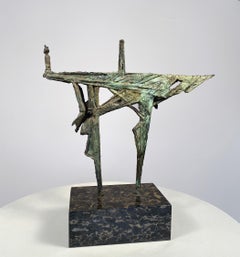Items Similar to Four Figures
Want more images or videos?
Request additional images or videos from the seller
1 of 13
Edgar TafurFour Figuresca. 1960
ca. 1960
About the Item
Four Figures, ca. 1960. Welded bronze, 14.5 x 9.75 x 3 inches. Signed at base.
Edgar Tafur, born and raised in Colombia, was first trained as an architect at the University of the Andes, but shortly thereafter switched his focus to sculpture. It is this work which brought Tafur to the United States, first to study at the University of Florida and then to Oklahoma where he was featured in a solo exhibition at the Oklahoma Art Center in 1966. Alluding his architectural roots, Tafurs sculptures possess a marked structural form, drawing on themes of positive and negative space. In addition to his work as a sculptor, Tafur was well known for his concept designs, consisting of fountains and architectural murals commissioned by fellow architects. The present lot was part of an architectural installation at the 5th/3rd bank in Cincinnati, OH.
- Creator:Edgar Tafur (1929)
- Creation Year:ca. 1960
- Dimensions:Height: 9.75 in (24.77 cm)Width: 14.5 in (36.83 cm)Depth: 3 in (7.62 cm)
- Medium:
- Movement & Style:
- Period:
- Condition:
- Gallery Location:Wilton Manors, FL
- Reference Number:1stDibs: LU245214751592
About the Seller
4.9
Platinum Seller
Premium sellers with a 4.7+ rating and 24-hour response times
Established in 2007
1stDibs seller since 2015
387 sales on 1stDibs
Typical response time: 3 hours
- ShippingRetrieving quote...Shipping from: Wilton Manors, FL
- Return Policy
Authenticity Guarantee
In the unlikely event there’s an issue with an item’s authenticity, contact us within 1 year for a full refund. DetailsMoney-Back Guarantee
If your item is not as described, is damaged in transit, or does not arrive, contact us within 7 days for a full refund. Details24-Hour Cancellation
You have a 24-hour grace period in which to reconsider your purchase, with no questions asked.Vetted Professional Sellers
Our world-class sellers must adhere to strict standards for service and quality, maintaining the integrity of our listings.Price-Match Guarantee
If you find that a seller listed the same item for a lower price elsewhere, we’ll match it.Trusted Global Delivery
Our best-in-class carrier network provides specialized shipping options worldwide, including custom delivery.More From This Seller
View AllUntitled (Organic abstract bronze sculpture)
Located in Wilton Manors, FL
Klaus Ihlenfeld (b.1934). Untitled, ca. 1960. Welded bronze. 8" h.; 5.5 " w; 3.25" d (base). Signed with initial under base.
Provenance: Directly from estate of Harry Bertoia. The piece was a gift from Ihlenfeld and is a very early example created during Bertoia apprenticeship era.
Excellent condition.
Klaus Karl Otto IhlenfeldHe was born in Berlin, Germany in 1934. He studied art at the Hochschule für Bildende Künste and completed graduate work with the metal sculptor Hans Uhlmann. He visited the US in 1957 for the first time living in Durham, NC, where he befriended Dr. W. R. Valentiner, the Rembrandt authority and Director of the Museum of Art, Raleigh, NC. Through this friendship in 1960 he met and worked with the metal sculptor Harry Bertoia in Barto, PA.
He joined the Staempfli Gallery in NYC and entered in many group and one-man shows. He has been an Artist-in-Residence in Ogden, Utah; Huntington Museum of Art in West Virginia, Penn State University at University Park; the Colorado State University in Denver; and Shippensburg University. He has large commissions at Kutztown University, Pottstown Hospital, and a monumental relief sculpture at the Emigrant Savings Bank in NYC. He has traveled extensively in Spain, Greece, and Mexico. He is living and working on a farm in Barto, PA welding bronze and forged iron metal sculptures and painting watercolors.
Group Shows:
North Carolina Museum of Art in Raleigh, NC - 1957
Solomon R. Guggenheim Museum in New York City - 1962
Staempfli Gallery in New York City - 1962, 1964 and 1965
Gallery Ludwig Lange in West Berlin, Germany - 1977
Gallery Herbert Remmert and Dr. Barth in Dusseldorf in West Germany - 1981
Jack Savitt Gallery in Macungie, PA - 1981 and 1984
Heinz Ortleb Gallery, West Berlin, Germany - 1992
Central Bucks Chamber of Commerce Show at the James A. Michener Art Museum in Doylestown, PA - 1997
Berks Art Alliance Show at the Reading Art Museum in Reading, PA - 1997
Mayfair Festival of the Arts at the Allentown Art Museum - 1998
Baum School of Art in Allentown, PA - 1997
Schwenkfelder Library and Heritage Center Art Show in Pennsburg, PA - 2001
Reading Public Museum in Reading PA, 2014
Solo Shows:
Kutztown University in Kutztown, PA - 1960 and 1965
Allentown Art Museum in Allentown, PA - 1960 and 1961
Staempfli Gallery in New York City - 1962
Penn State University in University Park, PA - 1964 and 1972
Berks Art Alliance in Wyomissing, PA - 1966
Bertha Eccles Art Center in Ogden, Utah - 1967
Mansfield University in Mansfield, PA - 1967
Huntington Museum of Art in Huntington, WV - 1971
Shippensburg University in Shippensburg, PA - 1972
Albright College in Reading, PA - 1973
Ianuzzi Gallery in Scottsdale, AZ - 1974
Gallery Heimat 85 in West Berlin, Germany - 1977
Jack Savitt Gallery in Macungie, PA - 1981
College Misericordia in Dallas, PA - 1983
Schwenkfelder Library and Heritage Center in Pennsburg, PA, 2013
Periodical Reference:
Kaye, Ellen "The Obsessive Collector," Philadelphia Inquirer Sunday Magazine Sptember 21, 1986 pp. 32-33.
Chronology:
1-30-1934 Born in Berlin, Germany. Father, Kurt Ihlenfeld, Lutheran pastor, novelist, critic and publisher was born in 1901 in Colmar, Alsace Lorain. Mother, Annie Stuhlmann, was born in 1905 in Breslau, Lower Silesia.
1940 - 1950 Public schools in Berlin; Löwen, Lower Silesia; Coswig, Radebeul, Glaubitz, Saxony. Königin Luise-Gymnasium in Dahlem, Berlin. First artworks, drawings and paintings; few sculptures.
1950 - 1956 Studied at the Hochschule für Bildende Künste in West Berlin, Germany. Graduate work with metal sculptor Hans Uhlmann. For 2 years maintained own studio at the Academy. Friendship with writer Günter Grass, and painter F. S. Sonnenstern. Met painters: Max Pechstein, Karl Schmidt-Rottluff, Carl Hofer, Max Kaus, and sculptors: Bernhard Heiliger, Renee Sintenis, and Richard Scheibe...
Category
Mid-20th Century Abstract Abstract Sculptures
Materials
Bronze
$5,000 Sale Price
37% Off
Reaching (bronze hand)
Located in Wilton Manors, FL
Reaching, ca. 1980. Cast bronze. Signed in lower region on wrist.
A rare example from the artist's later period influenced by figurative abstraction with expressionist tendencies.
James Edward Lewis (August 4, 1923 – August 9, 1997) was an African-American artist, art collector, professor, and curator in the city of Baltimore. He is best known for his role as the leading force for the creation of the James E. Lewis Museum of Art, an institution of the HBCU Morgan State University. His work as the chairman of the Morgan Art Department from 1950 to 1986 allowed for the museum to amass a large collection of more than 3,000 works, predominantly of African and African diasporan art.[1] In addition, he is also well known for his role as an interdisciplinary artist, primarily focused on sculpture, though also having notable examples of lithography and illustration. His artistic style throughout the years has developed from an earlier focus on African-American history and historical figures, for which he is most notable as an artist, to a more contemporary style of African-inspired abstract expressionism.
Early and personal life
James E. Lewis was born in rural Phenix, Virginia on August 4, 1923 to James T. Lewis and Pearline (Pearlean) Harvey.[5] Lewis' parents were both sharecroppers. Shortly after his birth, his father moved to Baltimore for increased job opportunity; James E. was subsequently raised by his mother until the family was reunited in 1925. They lived for a short time with distant relatives until moving to a four-bedroom house on 1024 North Durham Street in East Baltimore, a predominantly African-American lower-class neighborhood close to Johns Hopkins Hospital. Lewis' primary school, PS 101, was the only public school in East Baltimore that served black children. Lewis grew up in a church-going family, his parents both active members of the Faith Baptist Church, devoting the entirety of their Sundays to church activities. His parents worked a variety of different jobs throughout his youth:[6] his father working as a stevedore for a shipping company, a mechanic, a custodian, a mailroom handler,[6] and an elevator operator.] His mother worked as both a clerk at a drugstore[7] and a laundress for a private family.[4]
Lewis' primary exposure to the arts came from Dr. Leon Winslow, a faculty member at PS 101 who Lewis saw as "providing encouragement and art materials to those who wanted and needed it." In fifth grade, Lewis transferred to PS 102. Here, he was able to receive specialized Art Education in Ms. William's class under the guidance of Winslow. He was considered a standout pupil at PS 102 as a result of his introduction to the connection between the arts and the other studies. His time spent in Ms. Pauline Wharton's class allowed for him to experiment with singing, to which he was considered a talented singer. His involvement in this class challenged his earlier belief that singing was not a masculine artistic pursuit. He was able to study both European classics and negro spirituals, which was one of his earliest introductions to arts specific to American black culture. Under Ms. Wharton's direction, he was also involved in many different musical performances,[6] including some works of the Works Progress Administration's Federal Theatre Project.[8] Lewis attended Paul Laurence Dunbar High School, where his love of the arts was heightened through his industrial art class with Lee Davis...
Category
Mid-20th Century Abstract Expressionist Abstract Sculptures
Materials
Bronze
$4,000 Sale Price
20% Off
Greek Guitar Player
Located in Wilton Manors, FL
Beautiful abstract sculpture depicting a guitar player. Bronze on wood base measuring 15 x 9 x 4 inches. Actual cast piece without base measuring 17 x 7 x 3 inches. Signed indistinct...
Category
Mid-20th Century Abstract Abstract Sculptures
Materials
Bronze
$900 Sale Price
25% Off
Reclining Figure (woman)
By William King (b.1925)
Located in Wilton Manors, FL
William King (1925-2015). Reclining figure, ca. 1965. Cast and welded bronze, 7 x 9.5 x 5 inches. Unsigned.
William King, a sculptor in a variety of materials whose human figures traced social attitudes through the last half of the 20th century, often poking sly and poignant fun at human follies and foibles, died on March 4 at his home in East Hampton, N.Y. He was 90.
His death was confirmed by Scott Chaskey, who is married to Mr. King's stepdaughter, Megan Chaskey.
Mr. King worked in clay, wood, bronze, vinyl, burlap and aluminum. He worked both big and small, from busts and toylike figures to large public art pieces depicting familiar human poses -- a seated, cross-legged man reading; a Western couple (he in a cowboy hat, she in a long dress) holding hands; a tall man reaching down to tug along a recalcitrant little boy; a crowd of robotic-looking men walking in lock step.
But for all its variation, what unified his work was a wry observer's arched eyebrow, the pointed humor and witty rue of a fatalist. His figurative sculptures, often with long, spidery legs and an outlandishly skewed ratio of torso to appendages, use gestures and posture to suggest attitude and illustrate his own amusement with the unwieldiness of human physical equipment.
His subjects included tennis players and gymnasts, dancers and musicians, and he managed to show appreciation of their physical gifts and comic delight at their contortions and costumery. His suit-wearing businessmen often appeared haughty or pompous; his other men could seem timid or perplexed or awkward. Oddly, or perhaps tellingly, he tended to depict women more reverentially, though in his portrayals of couples the fragility and tender comedy inherent in couplehood settled equally on both partners.
Mr. King's work is in the collections of the Metropolitan Museum of Art and the Museum of Modern Art in New York and the Smithsonian American Art Museum in Washington, among other places, and he had dozens of solo gallery shows in New York and elsewhere. But the comic element of his work probably caused his reputation to suffer.
Reviews of his exhibitions frequently began with the caveat that even though the work was funny, it was also serious, displaying superior technical skills, imaginative vision and the bolstering weight of a range of influences, from the ancient Etruscans to American folk art to 20th-century artists including Giacometti, Calder. and Elie Nadelman.
The critic Hilton Kramer, one of Mr. King's most ardent advocates, wrote in a 1970 essay accompanying a New York gallery exhibit that he was, "among other things, an amusing artist, and nowadays this can, at times, be almost as much a liability as an asset."
A "preoccupation with gesture is the focus of King's sculptural imagination," Mr. Kramer wrote. "Everything that one admires in his work - the virtuoso carving, the deft handling of a wide variety of materials, the shrewd observation and resourceful invention - all this is secondary to the concentration on gesture. The physical stance of the human animal as it negotiates the social arena, the unconscious gait that the body assumes in making its way in the social medium, the emotion traced by the course of a limb, a torso, a head, the features of a face, a coiffure or a costume - from a keen observation of these materials King has garnered a large stock of sculptural images notable for their wit, empathy, simplicity and psychological precision."
William Dickey King...
Category
Mid-20th Century Abstract Abstract Sculptures
Materials
Bronze
$2,800 Sale Price
30% Off
Walking Man with Disc
By Ernest Trova
Located in Wilton Manors, FL
Beautiful figural sculpture by American artist, Ernest Tino Trova (1927-2009). Walking Man with Disc (working study), 1966. Brass sheet with cut-out figure in profile, sheet measures...
Category
Mid-20th Century Abstract Figurative Sculptures
Materials
Brass
$1,200 Sale Price
65% Off
Nexus
By Jack Youngerman
Located in Wilton Manors, FL
Abstract sculpture by American artist, Jack Youngerman (b.1926). Nexus, 1990. 24.5 inches. Aluminum, numbered 2/3. Signed and numbered on base.
1926 Born, St. Louis, Missouri; moved with family to Louisville, Kentucky in 1929
1943-44; 1946-47 Attended University of Missouri
1944-46 U.S. Navy, University of North Carolina
1947-49 Ecole des Beaux-Arts, Paris
1949-55 Lived and worked in Paris
1956 Returned to the United States; lived in New York City 1956-1995
1995-current Resides in Bridgehampton, New York
ONE MAN EXHIBITIONS:
1951 Galerie Arnaud, Paris
1958 Betty Parsons Gallery, New York (1960, 1961, 1964, 1967, 1968)
1959 Museum of Modern Art, New York, "Sixteen Americans"
1962 Galerie Lawrence, Paris (also 1965)
1963 Galeria dell' Ariete, Milan
Everett Ellen Gallery, Los Angeles, California
The Phillips Collection, Washington, D. C.
1971 Pace Gallery, New York (also 1972, 1975)
1972 Portland Center for the Arts, Oregon
Seattle Art Museum, Washington
1973 The Arts Club of Chicago, Illinois
Galerie Denise Rene, Paris
1975 Hopkins Center, Dartmouth College, Hanover, New Hampshire
1976 Parrish Art Museum, Southampton, New York
1981 Washburn Gallery...
Category
1980s Abstract Abstract Sculptures
Materials
Aluminum
$4,500 Sale Price
30% Off
You May Also Like
Schwerelos Gold by Kuno Vollet - Contemporary Golden bronze sculpture
By Kuno Vollet
Located in DE
Artist: Kuno Vollet
Title: Schwerelos Gold
Materials: Bronze sculpture with a dark patina on black granite base
Size: 65cm height of upper sculpture, base: 18 x 18 cm x 8 cm
Lim...
Category
21st Century and Contemporary Abstract Abstract Sculptures
Materials
Granite, Bronze
French Pop Art Heavy Bronze Sculpture Chess Game Gambit Arman Accumulation
By Arman
Located in Surfside, FL
Arman, French American (1928-2005)
Gambit (Chess pieces)
Cast Bronze Sculpture with patina
Incised signature near lower edge, 48/70 with
impressed "Bronze Romain & Fils" foundry ma...
Category
Early 2000s Abstract Figurative Sculptures
Materials
Bronze
"Striper", Bronze Wall Relief Sculpture, Abstract, Metal, Contemporary
By Kevin Barrett
Located in New York, NY
"Striper" by Kevin Barrett
Sculptural wall piece in bronze metal
Barrett is noted for creating contemporary metal sculpture and sculpture wall pieces for indoor and outdoor display....
Category
2010s Abstract Abstract Sculptures
Materials
Metal, Bronze
Seraph or Angel Figural Scultpure
By Albert W. Wein
Located in Greenwich, CT
What makes this sculpture special is the wonderful melding of abstraction with content and the textured approach to surface of the bronze. What is also striking is the form of the A...
Category
Mid-20th Century Abstract Abstract Sculptures
Materials
Bronze
Ewe and Me - Desktop (black) 19/100
By Kevin Box
Located in Napa, CA
“It took two years of tireless experimentation for me to develop the process of casting paper into bronze, another seven years to perfect, and it continues to evolve today.” - Kevin ...
Category
2010s Abstract Abstract Sculptures
Materials
Metal, Bronze, Stainless Steel
Bronze Sculpture Abstract Brutalist Goat or Ram WPA Artist Mounted on Base
By Benedict Michael Tatti
Located in Surfside, FL
Benedict Tatti (1917-1993) worked in New York city as a sculptor, painter, educator, and video artist. He studied stone and wood carving under Louis Slobodkin at the Roerich Museum. He later attended the Leonardo da Vinci School of Art studying under Attilio Piccirelli. In l939 he taught adult classes with the Teachers Project of the WPA and attended the Art Students League for three and a half years on full scholarship. He studied under William Zorach and Ossip Zadkine and later became Zorach’s assistant. Later in his career, he attended the Hans Hofmann School of Fine Arts. During World War II, Tatti served in the United States Army Air Force, where he spent three years assigned to variety of projects. In 1948, Benedict Tatti married Adele Rosenberg in New York City.
Throughout his career, Tatti continuously experimented with various media. From 1952-1963, Tatti executed sculptural models of architectural and consumer products for the industrial designers, Raymond Loewy Associates; later he became a color consultant for the firm. In the 1960s, influenced by the Abstract Expressionists, Tatti turned from carving directly in wood and stone to creating assemblage architecture sculptures, using bronze metal and other industrial materials.
He was included in the important show "Aspects de la Sculpture Americaine", at Galerie Claude Bernard Paris, France, in October 1960 along with Ibram Lassaw, Theodore Roszak, David Smith, Louise Bourgeois, Danese Corey, Dorothy Dehner, Lin Emery, Lily Ente, David Hayes, Louise Nevelson, Tony Rosenthal, Richard Stankiewicz, Sam Szafran...
Category
Mid-20th Century Abstract Expressionist Abstract Sculptures
Materials
Bronze
